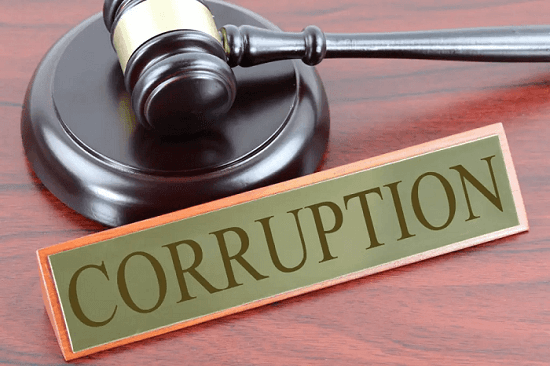Corruption Definition
Corruption is a type of dishonest or unethical activity by a person or organization that involves the misuse of power or position for one's profit or the benefit of a group or organization. Corruption frequently involves the illegal and unethical transfer of money from public goods & services to private interests, which harms society.

Corruption is a major issue that affects many governments and cultures all over the world. Corruption may occur at several levels of society, such as in government, business, or civil society.
Types of Corruption
The issue of corruption is intricate and multifaceted, and it can manifest itself in a variety of ways. Fundamentally, corruption refers to the abuse of power or position for one's benefit, frequently at the expense of the general welfare. Some of the most typical types of corruption are listed below:
Bribery- It is the act of offering or accepting something of value in return for a favor or special treatment.
Embezzlement- Theft or misappropriation of money or property by a person in charge of them.
Extortion- The act of obtaining money or other valuables from someone by use of force or threats.
Fraud- Intentional fraud or factual misrepresentation done to one's benefit.
Nepotism- The practice of giving preference to family members or friends in hiring decisions or business negotiations, frequently at the cost of more competent applicants.
Kickbacks- Giving someone who assisted in obtaining a contract a percentage of the contract's earnings.
Money laundering- It is the practice of hiding unlawful activity's earnings by making them seem like they came from respectable sources.
Influence peddling- Using one's position of authority or influence to manipulate the system or obtain an unfair advantage.
Cronyism- The act of putting one's friends or colleagues ahead of the general good in business or politics.
Graft- Using one's position of influence or authority for one's financial advantage, frequently using illegal or immoral methods.

Causes of Corruption
Corruption is a multifaceted issue with several underlying causes. The following are some of the causes of corruption:
- Lack of transparency- orruption thrives in settings where information is difficult for the general public to access. Public officials can more easily do corrupt actions without worrying about being held accountable when government operations are cloaked in secrecy.
- Inadequate legal and regulatory systems- Corruption-related laws and regulations are insufficient or poorly implemented in certain nations. This fosters an atmosphere where unethical behavior may flourish with no repercussions.
- Culture and social norms- Corruption is considered a common or even acceptable activity in some societies. It can be challenging to eradicate corruption when it is firmly embedded in a community.
- Lack of political will- Failure to address corruption can also result in its continuation. Corruption may become ingrained in society when political authorities can or unwillingly act against it.
- Lack of knowledge and education- Individuals who lack knowledge or education about corruption might be more inclined to engage in corrupt activities and may be less likely to expose it when they see it.
- Insufficient oversight and monitoring- Public officials can engage in corrupt behavior more easily when there is inadequate oversight & monitoring of government activities.
- Conflicts of interest- These situations can potentially lead to corruption. For instance, a public official could decide to give a contract to a business in which they have a financial stake rather than to the one that would offer taxpayers the most value.
- Poor pay and unfavorable working conditions- When earnings are low, or the working environment is unfavorable, some people may turn to corruption as a source of additional revenue.
- Self-interest and greed- Some people are just motivated by their self-interest and greed, and they view corrupt acts as a means to benefit from the misery of others while enriching themselves.
- International factors- External elements may also influence corruption. Multinational firms, for instance, can use dishonest methods to exploit natural resources or win contracts abroad.
Impacts of Corruption
Corruption may have serious impacts on people, societies, and countries. The following are some of the main impacts associated with corruption:
- Economic impacts- Corruption can cause poor resource allocation and slow economic progress. Public funds may be misappropriated from crucial public services like healthcare and education when public officials participate in corrupt behavior, which can impede economic growth.
- Social impacts- Corruption may have serious social consequences, such as decreased faith in institutions and the government, greater inequality, and restricted access to public services for disadvantaged groups.
- Political impacts- Corruption can make democratic institutions and procedures less trustworthy. People may lose faith in the political system and become less inclined to vote or engage in other political activities if they think the government is corrupt.
- Environmental impacts- Corruption may hurt the environment. For instance, illicit mining or logging operations can harm the ecosystem and undercut conservation efforts.
- Security impacts- Corruption may weaken security by allowing terrorist or criminal organizations to operate more freely. Corrupt authorities may also participate in money laundering or other illicit acts that support criminal activity.
- Human rights impacts- Corruption can have serious effects on human rights. For example, attempts to provide access to justice, defend the rights of vulnerable people, and end prejudice and injustice can be hindered by corruption.
Prevention of Corruption
A comprehensive strategy is needed to address the complicated and varied problem of corruption prevention. These are some specific recommendations for preventing corruption:
- Encourage transparency- Ensuring that government organizations and officials are open and honest about their decisions and actions is essential to eliminating corruption. This may be accomplished by adopting open data rules, making information available, and transparentizing all government transactions.
- Improve legal structure- To offer citizens and government officials clear rules and regulations, the legal framework has to be reinforced. These include regulations that make participating in corrupt practices like bribery and embezzlement illegal and impose severe penalties on offenders.
- Encourage responsibility- Responsibility is crucial for avoiding corruption. This can be done by setting up independent monitoring organizations, such as anti-corruption commissions, to look into and bring charges against corrupt officials. It's also critical to establish procedures through which citizens may expose corruption and demand that public servants take responsibility for their deeds.
- Improve whistleblower protection- Whistleblowers are crucial in exposing wrongdoing. Hence, it's critical to enact whistleblower protection laws that offer sufficient protections for people who reveal wrongdoing, such as protection from reprisal.
- Improve public procurement processes- Corruption is prevalent in public procurement. Thus, it is crucial to develop open and competitive procurement procedures, as well as precise criteria for assessing bids and a mechanism for keeping track of contractors' performance.
- Improve public awareness and education- Educating the public about the harmful consequences of corruption and the value of integrity can assist in avoiding corrupt behavior. Public awareness campaigns, civic education initiatives, and the incorporation of anti-corruption teaching into school curricula can all help with this.
- International Cooperation- Corruption is a worldwide issue that needs international collaboration. Governments should cooperate and pool their resources and knowledge to stop and punish corrupt behavior.
- Strengthening Civil Society- By keeping an eye on government operations and pushing for accountability and transparency, civil society organizations contribute significantly to the fight against corruption.
- Use of Technology- By enhancing accountability and transparency, technology may be utilized to fight corruption. The utilization of open data, e-government platforms, and other digital technologies should be investigated by governments.
- Citizen Participation- Last but not least, preventing corruption requires active public engagement. Public officials should be held accountable for their acts, and citizens should be encouraged to expose corrupt behavior.
Conclusion
In conclusion, fighting corruption requires a concerted effort because it is a complicated and multifaceted issue. Governments, civil society groups, and the corporate sector must work together to tackle corruption. This entails advancing accountability and transparency, bolstering the rule of law, raising salaries, bettering working conditions, and fostering a culture of honesty. Finally, fighting corruption is crucial for building a just, fair, and equitable society that benefits all of its members.
|


 For Videos Join Our Youtube Channel: Join Now
For Videos Join Our Youtube Channel: Join Now










